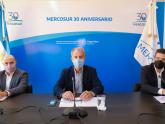“Democratizing, federalizing, and expanding the basis for public policies to promote exports is one of the main goals of our administration and we are achieving it thanks to joint efforts, constructive dialogue and public-private synergy,” stated the Secretary for International Economic Relations, Jorge Neme, who on 14 April headed the presentation of the official 2021 Plan to Promote Exports.
The 2021 Export Promotion Plan is the result of the work done within the Public-Private Export Promotion Council, comprising 240 Chambers and entities linked to foreign trade and grouping 18,300 companies which are part of 68 Argentine exporting sectors.
Secretary Neme explained that the goal is to “implement an international integration policy that allows Argentina to increase its exports –a genuine source of foreign currency for development- through a strategy of market and product diversification, expand presence in consolidated markets and, at the same time, enter more dynamic markets, where Argentina has competitive advantages.” He further added that “although the context of the pandemic is highly complex, Argentine exports are doing well and we aspire to surpass 2019 exports figures by reaching USD 70 billion.”
The launch was attended by about 480 representatives of business chambers, provincial governments, and companies from various sectors, including the agro-industrial, energy, food, metallurgic, steel, chemical industry, biotechnology, transport, services, nuclear, medical equipment, vehicle, robotics, ICT, pharmaceutical, logistics, and clothing sectors.
The Undersecretary for Trade and Investment Promotion, Pablo Sívori, noted that the 2021 Export Promotion Plan provides for 657 trade promotion initiatives, including 140 fairs, 295 trade missions, 93 positioning initiatives, 40 business rounds, and 89 technological offer workshops.
While describing the strategy for each region, Sívori stated that “in Africa, we want to become technology and services suppliers for their productive development, especially for their agricultural sector.” Regarding Asia, he explained that “particularly in China, India and the Middle East, we want to be strategic partners as food suppliers to guarantee food security for an increasing population with higher income and more sophisticated consumption patterns.”
“Regarding North America, the Plan intends to enhance and strengthen links, given the importance and dynamism in terms of international trade flows and investments, in order to reassert our presence as suppliers of industrial goods and of goods and services of the knowledge economy,” he concluded.
The Chief Executive Officer of the Argentine Investment and International Trade Agency (AAICI), Juan Usandivaras, stated that “we wish to build an export-oriented culture and the Agency aims to serve as a bridge between the exporting strategy of Argentina and the day-to-day activities of businesses.” In addition, he highlighted the goal of “including another thousand SMEs into the Export Challenge Program” and “having 20% more activities than last year, during which we took 1,315 Argentine companies abroad through virtual fairs.”


